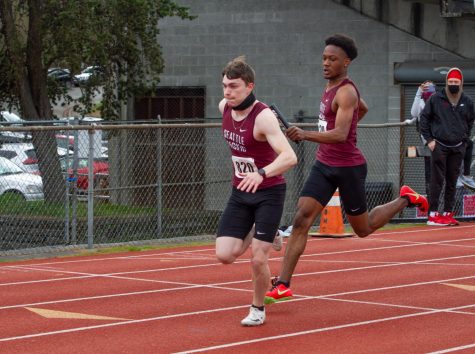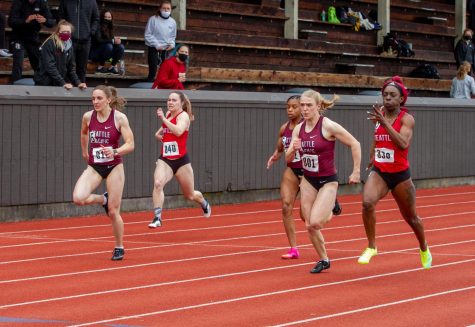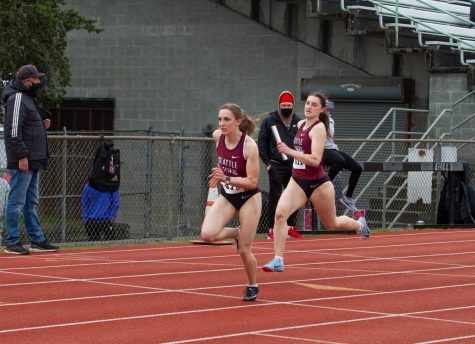Blink and you’ll miss them
SPU’s sprinters emphasize focus when competing in their event
April 20, 2021

Seattle Pacific University sprinter Jeff Gordon was a football player first and foremost, but speed was his greatest asset. His high school coach saw his speed as he ran down the field trying to break free from defenders and keep receivers at bay as a wide receiver and cornerback. They thought Gordon could excel in a different sport that they also coached, Track and Field.
Gordon was initially resistant, but his coaches kept nagging him. In his junior year of high school he finally gave it a chance.
“I kind of felt like it was punishment, honestly I did,” Gordon said. “Just knowing that I’m going to run every day, it was very daunting to know that.”
His feelings quickly shifted when he beat the fastest runner in his high school in a 200-meter race, and began to push himself to see where he could go in the future, leading to his eighth and thirteenth place finishes in the 100 and 200 meter dashes at the Virginia 5A state track and field championships. Now at SPU, Gordon will soon be competing on the track once he recovers from a hamstring injury.
Most sports can be described as a grind, a slow crawl toward the end destination. Even elements of track and field can feel that way, as distance runners run lap after lap toward the finish. For sprinters, the maximum they will run in a race is once around the track, which skilled runners can finish in around 50-55 seconds.

Because their events are shorter, the athletes don’t get a few laps to get up to speed. The runners need to get up to speed quickly, so they get a boost from the starting blocks, which they place their feet on and push off of to start the race.
“You do not realize how the starting blocks set you up for the rest of the race. If you are powerful from the start, you are already a step ahead of your competition. Sprinting events are all about who wants it more and who is willing to dig and fight for that win,” Jenna Bouyer said.
Freshman Charisma Smith takes this to heart, focusing on how she can make herself better and improve her time before each race.
“When I’m racing, I kind of go into a zone where I’m focused in on the physical and mental battle of wanting to do the best that I can do,” Smith said. “It’s exciting to give everything I have and see where that can take me.”
Distance running is all about endurance and stamina, whereas in sprints, there is no time to think. All the energy must be expended at once.
“Everything kind of becomes a blur, you don’t really focus on anything else besides your running, and sometimes the people around you that you’re racing against,” freshman Evan Carpenter said. “It’s tunnel vision, basically, and it’s so exhilarating.”
While others are passionate about distance running, senior Julia Stepper appreciates the short nature of her events.

“I enjoy running, but not enough to go more than once around the track,” Stepper said.
Running fast for a short distance brings many different emotions, but racers often feel the pressure and many different emotions even as the race begins.
“I am excited to get in the blocks and feel my speed and power, but I also am so nervous that I want to puke beforehand. There is no room for error and one small mistake can cost me the race. There’s no second chances on the track,” Stepper said.
Stepper’s mentality has allowed her to achieve success, finishing seventh in the 100-meter dash in the 2019 GNAC outdoor championships and finishing in fourth in the 200-meter dash at the 2020 GNAC indoor championships.
While track is largely an individual sport, team points add up. This makes the team part of the competition, and cheering on your teammates all the more important, and it can be a huge motivator.
“To hear the cheering and just the support from the sideline, it really gives you that extra ‘oomph’ that you need to make it across that finish line and really dig deep,” Gordon said.
Bouyer makes it a priority to encourage her teammates and keep them in positive mindsets, so that they can do better in the next race, and her teammates do the same. For freshmen like Smith, it seems to be working.
“Being able to lean on my teammates for advice and support has helped me to grow mentally stronger when preparing for my races, but it has also helped me after the race is over because whether I’m disappointed or celebrating, they’re right there with me,” Smith said.


























































































